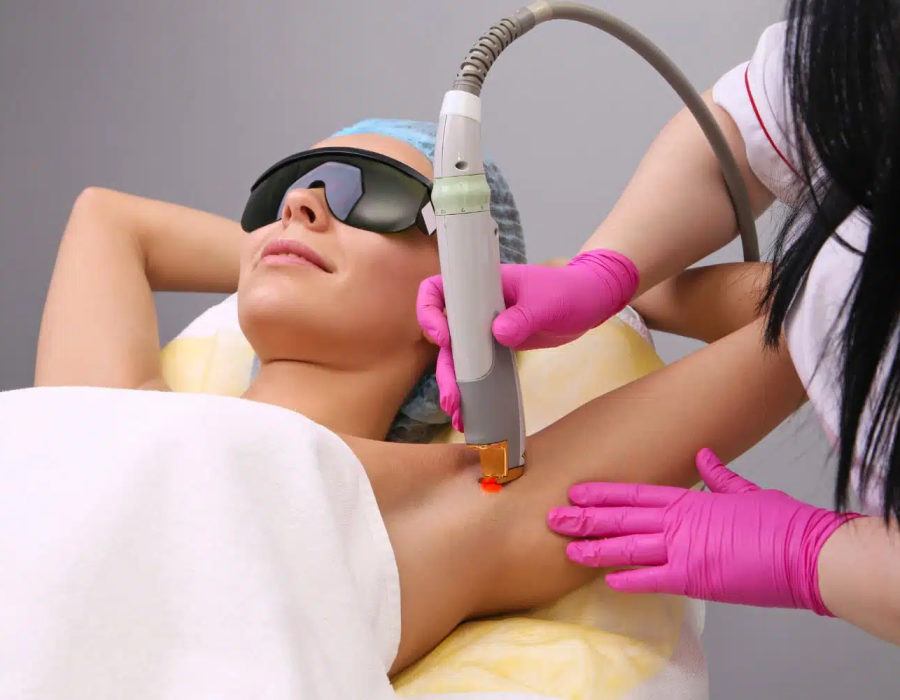Laser hair removal has gained immense popularity as a long-term solution to unwanted body hair. Unlike waxing or shaving, laser hair removal offers a more permanent reduction in hair growth, making it an attractive option for those looking to simplify their beauty routines. However, to get the best results from your laser hair removal treatment, proper preparation and post-treatment care are essential. Here are some ultimate tips to ensure you achieve smooth, hair-free skin effectively and safely.
Understand Your Skin and Hair Type
Before scheduling a laser hair removal session, it's essential to know that not all skin and hair types respond to the treatment in the same way. Laser technology targets the pigment (melanin) in hair follicles. Darker hair typically absorbs the laser's light more effectively, making it easier to remove, while lighter hair (blonde, gray, or red) may not respond as well. Similarly, those with darker skin tones should opt for specific laser types, such as Nd
lasers, which are safer for darker skin.Consulting with a certified professional will help determine the best course of action based on your individual skin tone and hair color. This ensures that you receive the most effective treatment for your specific needs.
Pre-Treatment Tips for Best Results
One of the most important aspects of laser hair removal is preparing your skin properly before each session. Here are the key steps to follow:
1. Avoid Sun Exposure
Laser hair removal works best on lighter skin, so it's crucial to avoid sun exposure for at least two weeks before your treatment. Tanned skin can increase the risk of burns and other side effects, as well as reduce the effectiveness of the laser. Always wear sunscreen with a high SPF if you're going to be in the sun for extended periods, and consider wearing protective clothing to minimize UV exposure.
2. Shave Before Your Session
While it may seem counterintuitive, you should shave the treatment area 24 to 48 hours before your laser hair removal appointment. Shaving removes the hair above the skin's surface but leaves the root intact, which is what the laser targets. Avoid waxing, plucking, or threading before your session, as these methods remove the hair from the follicle, making the laser less effective.
3. Skip Skincare Products on Treatment Day
On the day of your treatment, it's essential to avoid applying any skincare products, such as lotions, creams, or deodorants, to the treatment area. These products can interfere with the laser's ability to penetrate the skin and target the hair follicles, leading to less effective results. Make sure your skin is clean and free from any oils or residue before your appointment.
4. Stay Hydrated
Hydration is key for your skin's overall health, and it can also help improve the results of your laser hair removal treatment. Make sure to drink plenty of water in the days leading up to your appointment to keep your skin hydrated and supple.
What to Expect During Your Treatment
During the laser hair removal process, a technician will use a handheld laser device to target the hair follicles in the treatment area. You may feel a slight sensation, often described as similar to the snap of a rubber band, but the level of discomfort varies depending on the individual's pain tolerance and the area being treated. Most modern laser systems have built-in cooling mechanisms to minimize discomfort.
Sessions typically last anywhere from 15 minutes to over an hour, depending on the size of the treatment area. Multiple sessions are usually required for optimal results, as the laser only affects hair in the active growth phase. On average, most people need between six and eight sessions, spaced four to six weeks apart, to achieve significant hair reduction.
Post-Treatment Care for Best Results
How you care for your skin after each laser session is just as important as how you prepare for it. Follow these steps to maximize the effectiveness of your treatment and reduce the risk of side effects:
1. Avoid Sun Exposure Post-Treatment
Just as pre-treatment sun avoidance is essential, it's equally important to avoid sun exposure for at least two weeks after your laser session. Your skin may be more sensitive following the treatment, making it more prone to burns and hyperpigmentation. Always apply sunscreen with a high SPF when going outdoors, and wear protective clothing to shield your skin.
2. Use Gentle Skincare Products
After your treatment, your skin may feel sensitive or slightly irritated. To soothe the area, apply aloe vera or a gentle moisturizer. Avoid using harsh skincare products, such as exfoliants or retinoids, as they can further irritate the skin. Stick to mild, fragrance-free products to promote healing.
3. Avoid Hot Showers and Intense Workouts
For at least 24 to 48 hours after your session, it's best to avoid activities that increase your body temperature, such as hot showers, saunas, or intense workouts. Heat can aggravate the treated area, potentially causing redness or swelling. Opt for lukewarm showers and light physical activity until your skin has fully calmed down.
4. Don't Pick or Scratch the Treated Area
It's normal to experience some minor redness or itching after your laser treatment, but resist the urge to scratch or pick at the treated area. Doing so can lead to irritation, infection, or scarring. If you experience discomfort, apply a soothing gel or cool compress to alleviate the symptoms.
Consistency Is Key
Laser hair removal is a process that requires patience and consistency. Skipping sessions or failing to follow your technician's advice can hinder your results. Since hair grows in cycles, it's important to attend all of your scheduled appointments to ensure that the laser can target hair in its active growth phase.
Additionally, keep in mind that while laser hair removal offers long-lasting hair reduction, touch-up sessions may be needed down the line to maintain your results, especially for areas with hormonal hair growth, such as the face.
Conclusion
Achieving the best results from laser hair removal requires careful preparation, consistent aftercare, and a solid understanding of how the process works. By following these ultimate tips, you'll be well on your way to smooth, hair-free skin with minimal discomfort and maximum effectiveness. Always consult with a certified professional to tailor the treatment to your skin and hair type for optimal results.






Comments